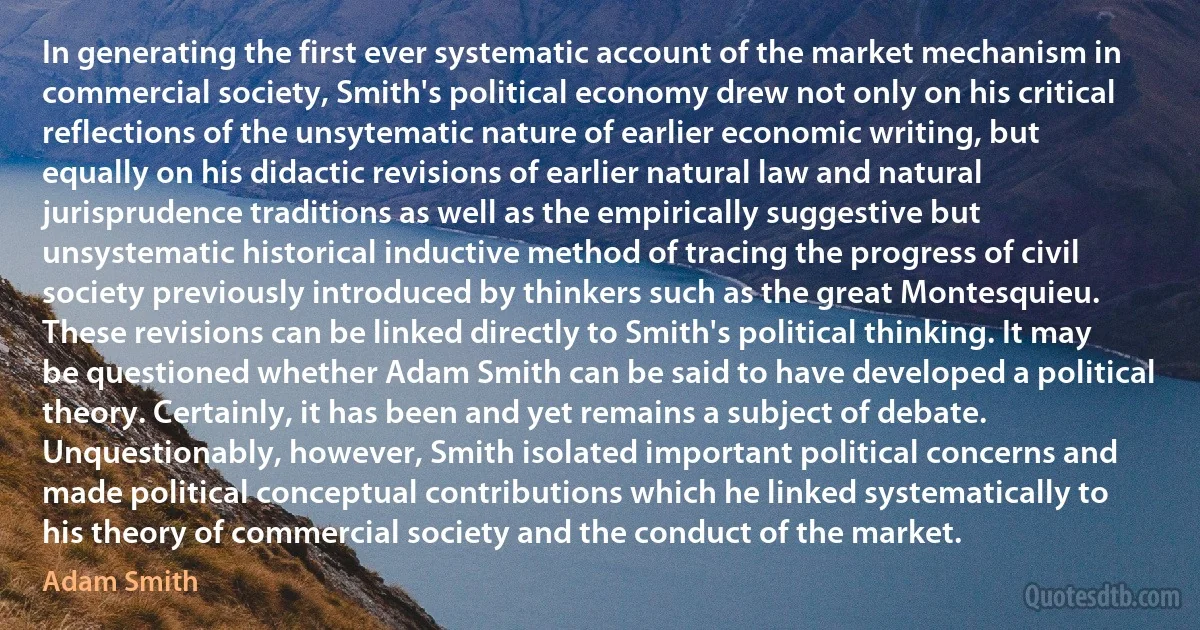
In generating the first ever systematic account of the market mechanism in commercial society, Smith's political economy drew not only on his critical reflections of the unsytematic nature of earlier economic writing, but equally on his didactic revisions of earlier natural law and natural jurisprudence traditions as well as the empirically suggestive but unsystematic historical inductive method of tracing the progress of civil society previously introduced by thinkers such as the great Montesquieu. These revisions can be linked directly to Smith's political thinking. It may be questioned whether Adam Smith can be said to have developed a political theory. Certainly, it has been and yet remains a subject of debate. Unquestionably, however, Smith isolated important political concerns and made political conceptual contributions which he linked systematically to his theory of commercial society and the conduct of the market.
Adam SmithRelated topics
account adam commercial conduct debate didactic drew early great historical jurisprudence law market mechanism natural nature say thinking tracing well yet remains montesquieuRelated quotes
In the following decades "Kierkegaard remained completely unknown, Schelling's work was contemptuously buried, and Marx and Feuerbach were interpreted as dogmatic materialists. Then a new impetus came in the 1880's with the work of Dilthey, and particularly with Freidrich Nietzsche, the "philosophy of life” movement, and the work of Berson. The third phase came after the shock of WWI – "Kierkegaard and the early Marxists were rediscovered and the serious challenges to the spiritual and psychological basis of Western society given by Nietzsche could no longer be covered over by Victorian self-satisfied placidity. The specific form of the third phase owes much to the phenomenology of Edmond Husserl, which gave to Heidegger, Jaspers, and the others the tool they needed to undercut the subject object cleavage which had been such a stumbling block to science as well as philosophy.

Rollo May
Each of our moral, mental, and bodily powers must have its development based upon its own nature, and not based upon artificial and outside influences. Faith must be developed by exercises in believing and cannot be developed from the knowledge and understanding, only, of what is to be believed; thought must grow from thinking, for it cannot come simply from the knowledge and understanding of what is to be thought, or the laws of thought; love must be developed by loving, for it does not arise merely from a knowledge and understanding of what love is and of what ought to be loved; art, also, can only be cultivated through doing artistic work and acquiring skill, for unending discussion of art and skill will not develop them. Such a return to the true method of Nature in the method of the development of our powers necessitates the subordination of education to the knowledge of the various laws which govern those powers.

Johann Heinrich Pestalozzi
Had it merely called to our attention the existence and exact nature of certain fundamental gaps in economic theory, the Theory of Economic Behavior by von Neumann and Morgenstern would have been a book of outstanding importance. But it does more than that. It is essentially constructive: where existing theory is considered to be inadequate, the authors put in its place a highly novel analytical apparatus designed to cope with the problem.
It would be doing the authors an injustice to say that theirs is a contribution to economics only. The scope of the book is much broader. The techniques applied by the authors in tackling economic problems are of sufficient generality to be valid in political science, sociology, or even military strategy. The applicability to games proper (chess and poker) is obvious from the title. Moreover, the book is of considerable interest from a purely mathematical point of view.

Leonid Hurwicz
The signal failure of the academic Marxists is in their obliviousness to the transformation of modern labor. In the age of mass media, power has shifted its meaning and loci. Capitalism, whatever its problems, remains the most efficient economic mechanism yet to bring the highest quality of life to the greatest number. Because I have studied the past, I know that, in America and under capitalism, I am the freest woman in history. Union blue-collar jobs now routinely pay higher salaries than are earned by most teachers. Physical labor, as a concrete skill occupation, is free of the soul-destroying office politics suffers by the Marxists' demonized managerial class, who take their jobs home with them and are in a continual funk of anxiety and neurosis. ... Unharried weekend leisure time is the center of working-class American life in ways the academic Marxists, resentfully marking papers and endlessly pressed for time, simply don't see.

Camille Paglia
The theories that I (and others) helped develop explained why unfettered markets often not only do not lead to social justice, but do not even produce efficient outcomes. Interestingly, there has been no intellectual challenge to the refutation of Adam Smith's invisible hand: individuals and firms, in the pursuit of their self-interest, are not necessarily, or in general, led as if by an invisible hand, to economic efficiency. The only question that has been raised concerns the ability of government to remedy the deficiencies of the market. Within academia, a significant fraction of economists are involved with developing and expanding on the ideas of imperfect information (and imperfect markets) that I explored. For instance, Edmund Phelps, this year's Nobel Prize winner, belongs to this "school" of thought. But in political discourse, simplistic "market fundamentalism” continues to exert enormous influence.

Joseph Stiglitz
